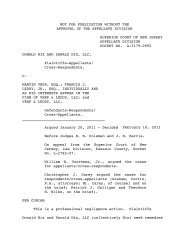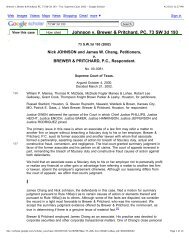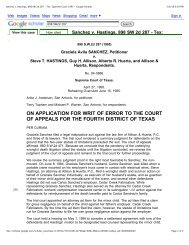Sebree v. SCHANTZ, SCHATZMAN - Legal Malpractice Law Review
Sebree v. SCHANTZ, SCHATZMAN - Legal Malpractice Law Review
Sebree v. SCHANTZ, SCHATZMAN - Legal Malpractice Law Review
You also want an ePaper? Increase the reach of your titles
YUMPU automatically turns print PDFs into web optimized ePapers that Google loves.
<strong>Sebree</strong> v. <strong>SCHANTZ</strong>, <strong>SCHATZMAN</strong>, AARONSON, 963 So. 2... http://scholar.google.com/scholar_case?case=11909677649313...<br />
847<br />
848<br />
established by testimony, affidavits and stipulations. It is of no moment in establishing facts<br />
that attorneys are `officers of the court' as we so often read when an unsworn representation<br />
is made.").<br />
However, even if we accept the unsworn assertions as true, they are insufficient *847 to<br />
sustain the "good cause" prong of Florida Rule of Civil Procedure 1.420(e) because the law<br />
firm essentially was proceeding pro se, and in any event it is charged as a litigant with all of<br />
the knowledge its counsel, Pico, had during 1999, when the default final judgment was<br />
vacated. See Andrew H. Boros, P.A. v. Arnold P. Carter, M.D., P.A., 537 So.2d 1134, 1135<br />
(Fla. 3d DCA 1989)("Generally, an attorney serves as agent for his client; the attorney's acts<br />
are the acts of the principal, the client."). See also Ruotal Corp., N.W. v. Ottati, 391 So.2d<br />
308, 309 (Fla. 4th DCA 1980)("It is axiomatic that knowledge of the agent constitutes<br />
knowledge of the principal as long as the agent received such knowledge while acting within<br />
the scope of his authority."). This is all the more true in this case given that the law firm<br />
appears not to seriously contest it received $1,500 at the time the Agreed Order was entered.<br />
The law firm's second argument in support of "good cause" in reliance upon Chandler also<br />
fails. On this argument, the firm urges that the apparent fact the court file was erroneously<br />
shown as being closed excuses its failure to immediately file something of record to preclude<br />
dismissal. However, the facts of this case are distinguishable from Chandler. In Chandler,<br />
substitute counsel failed to initiate any record activity for more than one year on an otherwise<br />
trial-ready suit on the strength of a communication he had with the office of the clerk of court<br />
during that period, where he was affirmatively misadvised concerning the pendency of the<br />
notice. Based upon this misadvice, substitute counsel took no action, but simply awaited a<br />
trial date in reliance upon his reasonable belief that he had taken all steps he could to<br />
prosecute the case to a conclusion. If we were to apply the reasoning of Chandler to this<br />
case, we would be required to make three additional inferences: (1) that if the docket<br />
reflected the case was not closed, Schantz, Schatzman somehow would have taken some<br />
additional steps, during the course of which it would have happened across the stray Agreed<br />
Order; (2) that upon discovering the Agreed Order, the law firm would have contemplated<br />
taking preventive action to assure that the case could not be dismissed for lack of<br />
prosecution; and (3) that it in fact would have taken such action. There is no record support<br />
for such inferences to be drawn, and we decline to engage in such speculation to save the<br />
law firm.<br />
In our view, this is a garden variety case of litigant negligence and inattention to its affairs. It<br />
is apodictic that neither litigant negligence nor inattention to deadlines constitutes "good<br />
cause" within the meaning of Florida Rule of Civil Procedure 1.420(e). Levine v. Kaplan, 687<br />
So.2d 863, 865 (Fla. 5th DCA 1997)("Good cause is inexcusable conduct other than<br />
negligence or inattention to deadlines. It has been defined by our courts as proof of some<br />
compelling reason why the suit was not prosecuted.")(emphasis added), disapproved on<br />
other grounds, Hall, 784 So.2d at 1091. Houswerth v. Sheriff's Dept., 567 So.2d 476, 476-77<br />
(Fla. 5th DCA 1990)("Appellant's ignorance of the duty to prosecute [a] case and the means<br />
to do so do not constitute `good cause' to avoid dismissal."). See also Freeman v. Toney, 608<br />
So.2d 863, 863 (Fla. 4th DCA 1992)("[A] change of attorneys is not good cause, nor are<br />
claims that counsel changed offices, suffered secretarial changes and simply overlooked the<br />
case."); Paedae v. Voltaggio, 472 So.2d 768, 769 (Fla. 1st DCA 1985)("Neither office errors<br />
nor inadvertence, nor lack of cooperation by a plaintiff have been held to constitute good<br />
cause."); Industrial Trucks of Fla., Inc. v. Gonzalez, 351 So.2d 744, 747 (Fla. 3d DCA *848<br />
1977)("Mere inadvertence or misrepresentations and erroneous assumptions of plaintiffs<br />
counsel in not prosecuting a cause for a period of one year does not constitute good cause<br />
why the action should remain pending"); Conklin v. Boyd, 189 So.2d 401, 404 (Fla. 1st DCA<br />
1966)("A party cannot be excused for failing to prosecute his cause of action as required by<br />
4 of 5 11/30/10 1:06 PM





